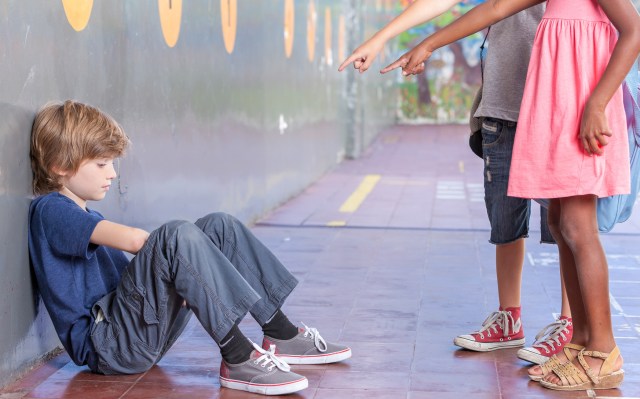Being bullied has taught me a lot over the years. Lessons learned in childhood run deep and last long. We learn to not be noticed. That we must try to fit in. That certain people and places and situations are hazardous. That being different is a sin.
But it is not only the things that children do to one another that cause harm. Some of the things that adults say to children about bullying hurt the most. These remarks may be intended to help the bullied child, but at times they do as much damage as the bullying itself.
Chief among the responses to bullying that adults come up with is “Sticks and stones may break my bones, but words will never hurt me.” This is a profound lie, as any bullied child knows. Oh, there are sticks and stones, even literal ones. As a third-grader I had rocks thrown at me and countless children have experienced physical bullying—pushing, tripping, hitting and more.
But words are more than capable of hurting just as much. There are forms of bullying other than physical – emotional, social, racial, sexual. But these forms of bullying are much less visible than the physical kind. If the grown-ups responsible for the care and well-being of the child don’t see bruises or bloody noses, they may think no harm has occurred.
Socially or emotionally bullied children are often told “Don’t be so sensitive.” And it may be true that less sensitive children do not feel the effects of cruel words as drastically. But the underlying message is that there is something wrong with the bullied child – excessive sensitivity. And this is not something that children can change about themselves. It’s like telling a person not to be so tall.
Another piece of advice commonly given to bullied children is, “Just ignore them.” If becoming less sensitive is impossible, even more so is ignoring bullies. Bullies are in-your-face. It’s almost impossible to ignore insults and injuries, derisive chants or laughter. Humiliation is not something that can simply be shrugged off. Bullies rejoice in having an audience for their abuse. It’s beyond hard to ignore a room or playground of kids (or teens), all of whom have witnessed your victimization.
Similarly, bullied children are told, “Other people’s opinions don’t matter.” Again, this is a lie. Of course they do. The opinions of a child’s peers control whether other children feel safe being friends with a bully’s victim. Their opinions determine whether a child will be lonely or despised or will develop self-esteem. Bullies affect the opinions of other children and make the circle of bullies and bystanders wider. Other people’s opinions make wide ripples.
Bullied children often hear, “Toughen up.” Again, this is an assignment given with no clue as to how it is to be accomplished. It may even be misinterpreted as tacit permission to become a bully too. After all, bullies are tough. And the saying, “If you can’t beat ’em, join ’em” may come into play. Naturally, this only expands the number of bullies and can victimize other children. A bullied child who becomes a bully may experience not a sense of empowerment but a sense of guilt.
Another common reaction to bullying is to encourage or even to coach a child in fighting back physically. This has little chance of working if the bully is physically larger than the victim and takes a lot of practice if it is to work at all. In addition it teaches children that violence is an appropriate solution to a problem. If the bullying has been emotional or social rather than physical, the bullied child is also likely to get in trouble for striking back in a literal manner.
The problem is that the bullied child is not the problem. He or she does not need to change or be changed. The bully is the one who is demonstrating unacceptable behavior and needs to be stopped. Bystanders are bullying enablers and need to learn how to support and intervene instead.
There are no simple solutions to bullying, which will likely continue as long as children are children, though with awareness of the problem and concerted efforts on the part of adults, it may someday lessen and be less acceptable and less accepted.
But whatever the solution is, it is clearly not to tell the bullied child lies.











